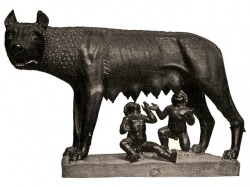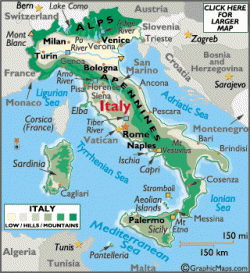Libenter homines id quod volunt credunt.
People gladly believe what they want to. - Caesar
(Bissette, 2009, para. 23)
The Legend

So, how did Rome begin?
According to legend, twin brothers Romulus and Remus were born from a vestal virgin (like a goddess) and a true god Mars. With such a great background, their human uncle became jealous. He wanted them gone! They threatened his power!! Well, to save himself, he put the twins down a river. Unfortunately for him, they did not die. A savior she-wolf adopted Romulus and Remus. She nursed them and raised them!
When Romulus and Remus grew up, a tension sprouted. They wanted to found a city, but of course, both of them could not rule. It was not natural! Romulus took matters into his own hands. He murdered Remus. He was free to found his own city Rome. Remember--Romulus=Rome
As appealing as this story sounds, it is a legend. In reality, a real person named Romulus founded Rome. He was from the Latins tribe.
Summary: Twins Romulus and Remus were born to god Mars and a vestal virgin. An uncle threw them down a river, and a she-wolf raised them. When they were older, Romulus killed Remus and founded Rome.
More information? Visit this link
According to legend, twin brothers Romulus and Remus were born from a vestal virgin (like a goddess) and a true god Mars. With such a great background, their human uncle became jealous. He wanted them gone! They threatened his power!! Well, to save himself, he put the twins down a river. Unfortunately for him, they did not die. A savior she-wolf adopted Romulus and Remus. She nursed them and raised them!
When Romulus and Remus grew up, a tension sprouted. They wanted to found a city, but of course, both of them could not rule. It was not natural! Romulus took matters into his own hands. He murdered Remus. He was free to found his own city Rome. Remember--Romulus=Rome
As appealing as this story sounds, it is a legend. In reality, a real person named Romulus founded Rome. He was from the Latins tribe.
Summary: Twins Romulus and Remus were born to god Mars and a vestal virgin. An uncle threw them down a river, and a she-wolf raised them. When they were older, Romulus killed Remus and founded Rome.
More information? Visit this link
Geography

Resting in middle Italy, Rome is located next to the Tiber River and off of the Mediterranean Sea. This is a strategic location...Remember water is very good. In ancient times, traveling on land would take many days. Obviously, automobiles didn't exist. People traveled on feet or with horses.
But people still needed to trade. How was it done? Through water travel! Since Rome was located off the Mediterranean Sea, it was easily accessible to others traveling by sea. Additionally, anybody so inclined to travel the Tiber River had access to the lovely Rome.
So...how does water benefit Rome? Economically!! Just as today, people enjoyed making money. Rome could buy other resources and items unavailable to them but also sell resources and items available to them to visitors.
Rome was also located in the middle of Italy. This helped them economically too. Anybody traveling from the North to the South (or South to North) would stop in Rome, granted that they traveled the west coast of Italy. But, who would not want to travel through Rome, right?
Rome had fertile soil, which, naturally, was good for farming. There were marshes too, but some of these were drained and buildings, like the Forum, were put in their places.
Summary: Rome was located on the coast of Italy next to the Mediterranean Sea and Tiber River. Because of this, trade took place and helped Rome economically. Additionally, Rome was located in the middle of Italy helping it as well.
More information: geography link
But people still needed to trade. How was it done? Through water travel! Since Rome was located off the Mediterranean Sea, it was easily accessible to others traveling by sea. Additionally, anybody so inclined to travel the Tiber River had access to the lovely Rome.
So...how does water benefit Rome? Economically!! Just as today, people enjoyed making money. Rome could buy other resources and items unavailable to them but also sell resources and items available to them to visitors.
Rome was also located in the middle of Italy. This helped them economically too. Anybody traveling from the North to the South (or South to North) would stop in Rome, granted that they traveled the west coast of Italy. But, who would not want to travel through Rome, right?
Rome had fertile soil, which, naturally, was good for farming. There were marshes too, but some of these were drained and buildings, like the Forum, were put in their places.
Summary: Rome was located on the coast of Italy next to the Mediterranean Sea and Tiber River. Because of this, trade took place and helped Rome economically. Additionally, Rome was located in the middle of Italy helping it as well.
More information: geography link
Ancient People of Rome
Etruscans:
These people came over the Alps around 4000BC! These people were smart and logical; think of them as engineers. They built sewer systems (like the Roman Forum), as well as temples and other buildings. Much of their style, technology, ideas, and even gods were "taken" from the Greeks.
Latins:
These people are the "true Romans." They actually developed the city of Rome near the Seven Hills of Palatine. Latins borrowed much from the Etruscans in the north and Greeks in the south.
Greeks:
These people lived in the southern Italian peninsula and the island of Sicily. They are what they seem like, Greeks. Greece built over 50 colonies in this area, bringing their people with them.
These people came over the Alps around 4000BC! These people were smart and logical; think of them as engineers. They built sewer systems (like the Roman Forum), as well as temples and other buildings. Much of their style, technology, ideas, and even gods were "taken" from the Greeks.
Latins:
These people are the "true Romans." They actually developed the city of Rome near the Seven Hills of Palatine. Latins borrowed much from the Etruscans in the north and Greeks in the south.
Greeks:
These people lived in the southern Italian peninsula and the island of Sicily. They are what they seem like, Greeks. Greece built over 50 colonies in this area, bringing their people with them.
The Republic
Pre-Republic:
Kings used to rule Rome. At some point, Etruscans came into rule. Etruscans are not native Romans (Latins are). Eventually, Tarquin the Proud was in control. The aristocratic did not like him or his decisions. They overthrew him. From then on, Romans feared absolute power, so they created a REPUBLIC.
Republic:
A republic is a type of government where citizens elect representatives to....represent them!
At the top of the republic were the consuls. These were two men elected by the senate and were aristocratic. Their term was for only a year, and after that year, each consul must wait 10 years until eligible to run again. These people commanded the army. When compared to American government, they would be like presidents of the executive branch.
Under the consuls was the senate. It consisted of about 300 elected patricians with life terms. Their most important job was policy, and they had the most influence over this. They could be compared to the legislative branch of American government.
Next in line was the assembly. The plebian's had the tribal assembly. They elected these tribunes, the name for representatives, for life. The tribunes could make laws. In fact, they made the 12 Tables (see below). The Roman soldiers also had an assembly called the Centuriate Assembly. It was like the Tribal Assembly, except soldiers elected their leaders.
Here is the power tree from above: Consuls=>Senate=>Tribal Assembly=>Centuriate Assembly. The most power rested with the consuls.
12 Tables:
The 12 Tables were some what like the American constitution. They were laws that everyone must follow, patrician or plebian. This was important in the Republic, because it limited the power of the Patricians. The plebeians, Tribunal Assembly, wrote these laws. The 12 Tables hung in the Forum, a public gathering place. Therefore, everybody had access to the laws!
Dictatorship??
In what Romans considered "troubled times" a dictator ruled Rome. Generally, these were when wars took place. The dictator ruled the army and had absolute power. The consuls elected him.
Summary: The Republic consisted of two consuls elected by the senate. The senators were elected by the aristocratic. Under them was the Tribal Assembly for plebeians and the Centuriate Assembly for soldiers. Romans had to follow the 12 Tables. In "troubled times" a dictator was elected.
More information: Republic
Review
What is the legend of Rome?
Who was Romulus?
Why was Rome in a good spot, for economic reasons?
What river was Rome located by? What sea?
What were the three original "tribes" in modern day Italy? Which ones were actual Romans?
What did a consul do? How many years did he serve?
Who was the senate made of? What did they do?
What were both assemblies?
Why were the 12 tables important to Rome?
When was a dictator put into power?
Can you compare Rome's republic to America's republic?
Who was Romulus?
Why was Rome in a good spot, for economic reasons?
What river was Rome located by? What sea?
What were the three original "tribes" in modern day Italy? Which ones were actual Romans?
What did a consul do? How many years did he serve?
Who was the senate made of? What did they do?
What were both assemblies?
Why were the 12 tables important to Rome?
When was a dictator put into power?
Can you compare Rome's republic to America's republic?
